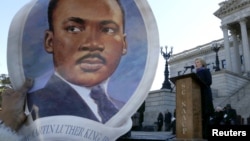Facing fresh campaign anxieties, Hillary Clinton is attaching herself to President Barack Obama, hoping to overcome liberal enthusiasm for Vermont Sen. Bernie Sanders with a full-throated embrace of her one-time rival and boss.
Central to that strategy: shoring up her standing with African-American voters who helped make Obama the first black president and who could determine her fate if she falters in the first-to-vote contests of Iowa and New Hampshire.
Clinton, Sanders and former Maryland Gov. Martin O'Malley marked Martin Luther King Jr. Day on the steps of the South Carolina statehouse, which, for the first time, was celebrated with no Confederate flag flying overhead. The event was replete with Obama's influence: as Clinton's two main challengers marched to the capitol, hundreds of faithful chanted the president's campaign mantra, "Fired Up. Ready to Go!''
"[King] was counting on all of us to keep going after he was gone, to be a part of what President Obama calls the 'Joshua Generation,' carrying forward the holy work the heroes of the civil rights movement began," Clinton said.
Clinton's alignment with Obama, who remains popular with Democrats, was on full display at Sunday night's final debate before the Iowa caucuses.
Presenting herself as his heir-apparent, Clinton warned that Sanders' universal health care plan threatened to reopen a contentious debate with Republicans that could undermine the so-called "Obamacare" law.
"To start over again with a whole new debate is something that I think would set us back. The Republicans just voted last week to repeal the Affordable Care Act, and thank goodness, President Obama vetoed it and saved Obamacare for the American people," Clinton said.
Sanders countered that his "Medicare for all" proposal was the natural evolution to the health care law, reminding Clinton that he played a role in its passage. "I'm on the committee that wrote the Affordable Care Act," he said.
When Sanders noted bluntly that he hadn't taken campaign contributions from Wall Street banks or lucrative speaking fees from Goldman Sachs, unlike Clinton, the former secretary of state tried to turn it into an attack on Obama.
And she resurrected comments Sanders had made about Obama before his re-election, suggesting the president would have benefited from a primary challenge.
"He's criticized President Obama for taking donations from Wall Street and President Obama has led our country out of the great recession," Clinton said. "Senator Sanders called him weak, disappointing. He even, in 2011, publicly sought someone to run in a primary against President Obama."
Clinton aides said Sanders, a self-identified democratic socialist who casts himself as above politics as usual, was undermining Obama's achievements by questioning the effectiveness of his party.
"The fact that he keeps saying that Democrats can't do things is just wrong," said Clinton campaign strategist Joel Benenson. "Democrats have gotten things done and they've done it under a Democratic president who happens to be named Barack Obama."
The rhetoric was a notable shift from several months ago, when Clinton frequently stressed that she was not running for Obama's third term.
Republicans are taking careful note of the new strategy and hope to use Clinton's ties to Obama to undercut her with skeptical independents in the general election, should she win the nominations.
Sanders' team says there's little daylight between the senator and Obama and note one major difference.
"There's only one candidate on that stage who ran against Barack Obama for president and it wasn't Bernie Sanders," said Tad Devine, a top Sanders adviser.
Sanders' strategy aims to capitalize on strong finishes in Iowa and New Hampshire to propel him in the two remaining contests in February: Nevada and South Carolina. Polls show Clinton with a big lead in South Carolina, helped by black voters, but the state's electorate has shifted in the past based on the outcome in the early voting.
Black voters make up more than half of the electorate in South Carolina's Feb. 27 primary and the question remains if Sanders, a 74-year-old white Vermont senator, can find new support within a black community against Clinton, whose husband was commonly referred to as the nation's first black president before Obama's rise.
Obama has no plans to endorse a candidate in the Democratic primary. But Clinton has the backing of most of Obama's close-knit political operation, as well as many senior administration officials, offering the clearest indication of the president's own views.
Obama and most of his advisers long ago put aside the animosity of the 2008 primary, though they still marvel at Clinton's occasional political tone deafness, including the email controversy that consumed her campaign last summer.
Still, they gained respect for her during her tenure as secretary of state and see her as the Democrat most likely to protect Obama's domestic and foreign policy legacy.
The president has far less of a personal relationship with Sanders, though the two have met privately.




